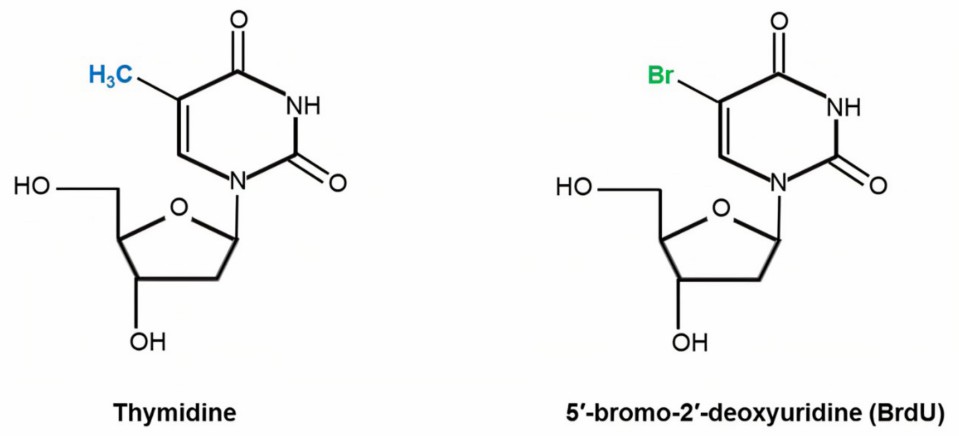T Cell-based BrdU Assay
Applying BrdU to Cancer Epitope Analysis
The specific cancer antigen-induced T cell response can be measured by detecting cell proliferation activities. DNA replication in dividing cells is the indicator of cell proliferation. As a consequence, the measuring of DNA replication becomes a reliable method to test cell proliferation.
Bromo-2'-deoxyuridine (BrdU), also known as bromodeoxyuridine, is an analog of thymidine. In the synthetic nucleoside, the methyl group of pyrimidine is replaced with bromine. During the cell replication period of the S-phase, the BrdU is easily incorporated into the new strand of DNA as a substitute for thymidine. With this analytical strategy, Creative Biolabs provides T cell-based BrdU assay for screening immunogenic epitopes involved in cancer antigens.
 Fig.1 The structure of thymidine and BrdU.3
Fig.1 The structure of thymidine and BrdU.3
T Cell-based BrdU Assay Services at Creative Biolabs
BrdU assay is a classical and broadly used method for the identification of cell proliferation. Creative Biolabs provides BrdU assay to help you find the most immunodominant T cell epitope candidates for targeted drug development.
Service

Main Steps of the BrdU Assay
 Fig.2 Main Steps of the BrdU assay for cancer epitope analysis.2
Fig.2 Main Steps of the BrdU assay for cancer epitope analysis.2
-
First, the mice are immunized with cancer antigens peptides to stimulate antigen-specific T cell generation.
-
Second, collect mice splenocytes and culture with a group of peptides treatments or with medium alone for days.
-
Then, the living cells are pulsed with fresh medium supplemented with BrdU for more than 10 hours. After removing the labeling medium, cells are fixed, and the DNA is denatured with a fixing/denaturing solution.
-
Finally, cells are assessed for antigen-specific proliferation. After anti-BrdU antibody staining, the antigen-specific, proliferating (BrdU+) CD4+ or CD8+ T cells are detected.
Techniques for BrdU Signal Detection
✔ Intracellular Flow Cytometric Analysis;
✔ Quantified by Enzyme-Labeled Second Antibody-Mediated Color Reaction;
✔ Optical Absorption Assay;
✔ Immunohistochemistry (IHC).
Highlights
The BrdU assay is a specific, direct, sensitive method for monitoring cell proliferation.
The antibody used to detect BrdU does not have a cross-reaction with other endogenous DNA of cells.
IHC, flow cytometric, and optical absorption assay are powerful techniques to measure the amount of BrdU.
-
Protect Yourself from Exposure to Toxic Substances
BrdU is a toxic and mutagenic material, and the experiment should be operated with necessary safeguard equipment for protection.
 Fig.3 Using BrdU to measure the immune responses of rats to PAP-derived peptides.1
Fig.3 Using BrdU to measure the immune responses of rats to PAP-derived peptides.1
Creative Biolabs' highly skilled team of experts is dedicated to offering the most proper methods for cancer epitope analysis. The assay details can be optimized to your special targets and needs. Please contact us, and get more information.
References
-
Johnson, Laura E.; et al. Immunization with a prostate cancer xenoantigen elicits a xenoantigen epitope-specific T-cell response. Oncoimmunology. 2012; 1(9): 1546-1556.
-
Ganesan, N.; et al. Methods to Assess Proliferation of Stimulated Human Lymphocytes In Vitro: A Narrative Review. Cells. 2023, 12: 386.
-
From Wikipedia: https://en.wikipedia.org/wiki/Bromodeoxyuridine#/media/File:Bromodeoxyuridine.svg https://en.wikipedia.org/wiki/Thymidine#/media/File:Desoxythymidin.svg
For Research Use Only | Not For Clinical Use


 Fig.1 The structure of thymidine and BrdU.3
Fig.1 The structure of thymidine and BrdU.3

 Fig.2 Main Steps of the BrdU assay for cancer epitope analysis.2
Fig.2 Main Steps of the BrdU assay for cancer epitope analysis.2
 Fig.3 Using BrdU to measure the immune responses of rats to PAP-derived peptides.1
Fig.3 Using BrdU to measure the immune responses of rats to PAP-derived peptides.1
 Download our brochure
Download our brochure